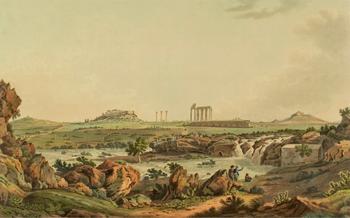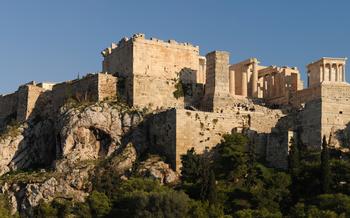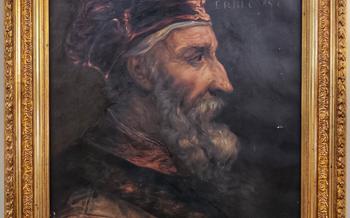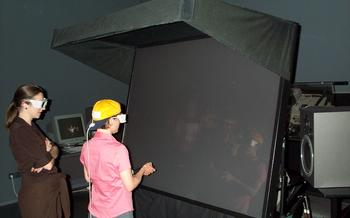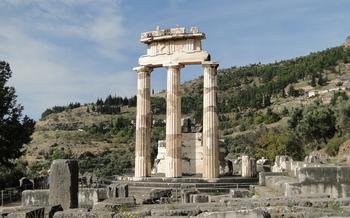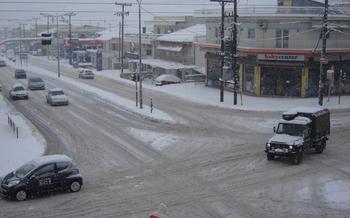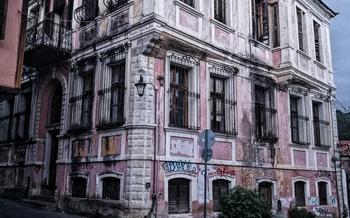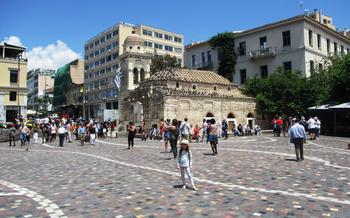
The Museum of the History of Education on Lesvos
- Mytilene's Museum of the History of Education: A Journey Through the Evolution of Learning
- Historical Context
- Exhibitions and Displays
- Educational Resources
- Guided Tours
- Hands-on Activities
- Research and Publications
- Preservation and Restoration
- Accessibility and Inclusivity
- Volunteer Opportunities
- Souvenirs and Merchandise
- Events and Workshops
- Online Resources
- Insider Tip: Making the Most of Your Visit
Mytilene's Museum of the History of Education: A Journey Through the Evolution of Learning
Background and significance: Nestled in the heart of Mytilene, the capital of Lesvos, Greece, the Museum of the History of Education stands as a testament to the rich educational heritage of the island. Founded in 1993, the museum is dedicated to preserving and showcasing the evolution of education in Lesvos, from ancient times to the present day. Through its diverse collection of artifacts, documents, and interactive displays, the museum offers visitors a unique opportunity to explore the history of learning and its profound impact on society.
Location and contact information: The Museum of the History of Education is situated in a beautifully restored neoclassical building in the heart of Mytilene, just a short walk from the city's picturesque harbor. Visitors can easily reach the museum by foot, by bus, or by taxi. For more information, contact the museum at [email protected] or visit their website at [museum's website].
Hours of operation and admission fees: The museum is open to the public Tuesday through Sunday from 10:00 AM to 4:00 PM. Admission fees are 5 euros for adults, 3 euros for students and seniors, and free for children under
Thematic exhibitions and displays: The museum's collection is organized into a series of thematic exhibitions that explore different aspects of education in Lesvos throughout history. These exhibitions include:
- Ancient Education in Lesvos: This exhibition showcases the educational practices and methods used in ancient Lesvos, including the role of philosophers, the importance of rhetoric, and the development of early writing systems.
- Byzantine and Ottoman Education: This exhibition examines the influence of Byzantine and Ottoman rule on education in Lesvos, highlighting the establishment of monastic schools, the rise of madrasas, and the impact of cultural exchange.
- Education during the Greek Revolution: This exhibition explores the role of education in the Greek Revolution, focusing on the establishment of clandestine schools, the importance of literacy in the struggle for independence, and the contributions of prominent educators.
- Modern Educational Reforms: This exhibition traces the development of modern education in Lesvos, from the establishment of the first public schools to the introduction of compulsory education and the impact of technological advancements on teaching and learning.
Historical Context
Education in ancient Greece laid the foundation for Western civilization. Greek philosophers such as Socrates, Plato, and Aristotle developed educational theories and practices that emphasized critical thinking, ethics, and the pursuit of knowledge. These ideas were disseminated through schools and academies, such as Plato's Academy and Aristotle's Lyceum, which attracted students from across the Hellenic world.
During the Byzantine and Ottoman periods, education in Lesvos was influenced by the respective religious and cultural traditions. Byzantine rule saw the establishment of monasteries and schools that focused on religious instruction and the preservation of classical Greek texts. Under Ottoman rule, madrasas and maktabs provided education in Islamic theology, literature, and languages.
The Greek Revolution of 1821 marked a turning point in education on Lesvos. The newly independent Greek state prioritized the establishment of a national education system based on the principles of democracy, equality, and universal access to education. Modern educational reforms and developments in the 19th and 20th centuries introduced compulsory education, teacher training institutions, and the expansion of educational opportunities for women and girls.
Exhibitions and Displays
The Museum of the History of Education on Lesvos houses a diverse collection of artifacts, documents, and interactive displays that bring the history of education in Greece to life. Visitors can explore thematic exhibitions showcasing ancient writing tablets, medieval manuscripts, Ottoman-era textbooks, and modern educational materials. Interactive displays highlight key themes and concepts, such as the evolution of teaching methods, the role of technology in education, and the challenges and triumphs of educational reform. Multimedia presentations and audio guides provide additional insights and context, making the museum accessible to visitors of all ages and backgrounds. Special exhibits and events throughout the year offer opportunities for deeper exploration of specific topics and issues related to education.
Educational Resources
The Museum of the History of Education on Lesvos serves as a valuable resource for scholars, researchers, and educators alike. Its extensive library and research facilities provide a wealth of information on the history of education, pedagogical theories, and educational practices from ancient times to the present day. The museum's collection includes rare books, manuscripts, school textbooks, and educational artifacts that offer insights into the evolution of education in Greece and beyond.
In addition to its research facilities, the museum offers a range of educational programs and resources for educators and teachers. Workshops, seminars, and conferences are regularly organized to provide professional development opportunities and foster collaboration among educators. The museum also collaborates with local schools and universities to develop educational programs for students of all ages, promoting a deeper understanding of the history of education and its impact on society. Through these initiatives, the museum plays a vital role in promoting educational innovation and excellence in the region.
Guided Tours
The Museum of the History of Education on Lesvos offers guided tours in multiple languages to enhance visitors' experiences and provide deeper insights into the exhibits. Knowledgeable and experienced guides lead these tours, sharing their expertise on the history of education in Greece and the significance of the artifacts and documents on display. Advance booking is recommended to secure a spot, especially for groups. Group discounts are also available. Customized tours can be arranged for specific interests and needs, allowing visitors to tailor their experience to their preferences. Whether you're a history buff, an educator, or simply curious about the evolution of education, these guided tours offer a personalized and enriching way to explore the museum's collection.
Hands-on Activities
The Museum of the History of Education on Lesvos offers a range of interactive exhibits that allow visitors to engage with educational concepts in a hands-on and immersive way. These exhibits are designed to promote a deeper understanding of the history of education and the various methods and practices that have been employed throughout the ages.
Visitors can engage in role-playing and simulation activities that recreate historical educational scenarios, providing a unique and experiential learning opportunity. Art and craft workshops are also available, inspired by historical educational practices, allowing visitors to create their own educational materials and explore the creative side of learning.
For children, the museum offers storytelling and theater performances that bring to life the history of education in a captivating and engaging manner. These performances not only entertain but also educate, helping children to understand the importance of education and the role it has played in shaping society.
Research and Publications
The Museum of the History of Education on Lesvos actively engages in academic research and publishes scholarly works that contribute to the field of educational history and pedagogy. In collaboration with universities and research institutions, the museum conducts in-depth studies on various aspects of education, including ancient Greek educational practices, the influence of Byzantine and Ottoman rule, and the impact of the Greek Revolution on education.
Through conferences, workshops, and publications, the museum disseminates its research findings to the academic community and the general public. These publications include scholarly articles, books, and exhibition catalogs that provide valuable insights into the history of education and its significance in shaping societies. By promoting academic discourse and contributing to the body of knowledge in educational history, the museum plays a crucial role in advancing the field and preserving its legacy for future generations.
Preservation and Restoration
The Museum of the History of Education on Lesvos is dedicated to preserving and restoring the rich educational heritage of Greece. The museum's collection includes a vast array of artifacts, documents, and educational materials that span centuries. To ensure the longevity of these precious items, the museum employs a team of skilled conservators who utilize state-of-the-art techniques and methodologies.
In collaboration with experts from universities and research institutions, the museum undertakes comprehensive restoration projects to bring damaged or deteriorated artifacts back to their original condition. This meticulous work involves careful cleaning, repair, and conservation treatments, using specialized materials and techniques to maintain the integrity and authenticity of each item.
By preserving and restoring these historical artifacts, the museum plays a crucial role in safeguarding the tangible legacy of education in Greece. These restored treasures serve as invaluable resources for researchers, educators, and visitors alike, providing a glimpse into the past and ensuring that the educational heritage of Lesvos continues to inspire and educate future generations.
Accessibility and Inclusivity
The Museum of the History of Education on Lesvos is committed to providing an accessible and inclusive environment for all visitors. The museum features ramps and elevators to ensure wheelchair accessibility throughout the building. Multilingual signage and materials are available for international visitors, and educational programs are tailored to diverse audiences. The museum actively promotes inclusivity and equal access to education, ensuring that everyone can learn and appreciate the rich history of education on Lesvos.
Volunteer Opportunities
The Museum of the History of Education on Lesvos welcomes passionate individuals to join its team of volunteers. Whether you have a background in education, history, or simply a desire to contribute to the preservation of educational heritage, there are various opportunities available.
Volunteers can assist with museum operations, such as conducting guided tours, assisting with educational programs, and helping with research projects. They also play a vital role in community outreach initiatives, such as organizing workshops, events, and public lectures.
The museum provides comprehensive training and support to its volunteers, ensuring that they are well-equipped to contribute effectively. Volunteering at the museum offers a unique opportunity to learn about the history of education, engage with the community, and make a meaningful impact on the preservation and promotion of educational heritage.
If you are interested in becoming a volunteer, please contact the museum's education department for more information and to discuss your interests and skills. The museum values the contributions of its volunteers and recognizes their dedication to promoting education and preserving its rich history.
Souvenirs and Merchandise
The Museum of the History of Education on Lesvos offers a unique opportunity to take home a piece of educational history through its well-stocked museum shop. Here, visitors can find a range of educational souvenirs and merchandise that are both meaningful and memorable. From books and replicas to educational toys, there is something for everyone interested in learning more about the history of education.
The museum shop features a carefully curated collection of books that delve into various aspects of educational history, including biographies of influential educators, studies on ancient educational practices, and explorations of modern educational trends. Replicas of historical educational artifacts, such as writing tablets, inkwells, and abacuses, offer a tangible connection to the past.
For those seeking a more interactive experience, the museum shop offers a variety of educational toys that are both fun and educational. These toys are designed to engage children in learning through play, fostering their curiosity and creativity. From puzzles and games that teach historical concepts to hands-on activities that simulate educational practices from different eras, there is something for children of all ages.
The proceeds from the sale of souvenirs and merchandise at the Museum of the History of Education on Lesvos directly support the museum's educational mission. By purchasing a memento from the museum shop, visitors not only take home a unique souvenir but also contribute to the preservation and promotion of educational heritage.
Events and Workshops
The Museum of the History of Education on Lesvos regularly hosts a variety of events, workshops, and seminars that delve into the fascinating world of education. These events provide a platform for professional development and networking for educators, while also offering engaging and informative experiences for the general public.
Topics covered in these events range from the history of education to contemporary educational issues, ensuring that there is something of interest for everyone. Workshops and seminars often focus on specific themes or methodologies, providing participants with practical skills and knowledge that they can apply in their own educational settings.
By attending these events, visitors can stay up-to-date on the latest educational trends and research, connect with like-minded individuals, and gain valuable insights into the ever-evolving field of education. The museum's events calendar is regularly updated, so be sure to check their website or social media pages for upcoming offerings.
Online Resources
The Museum of the History of Education on Lesvos has an interactive website that offers virtual tours, exhibits, and resources, making its rich collection accessible to a global audience. Visitors can explore the museum's galleries virtually, zoom in on artifacts, and read detailed descriptions. The website also features a digital archive and database, providing researchers and the general public with access to a wealth of educational history materials. Additionally, the museum offers online educational resources for teachers and students, including lesson plans, interactive activities, and downloadable materials. Through its online presence, the museum extends its reach beyond its physical walls, fostering a wider appreciation for the history of education.
Insider Tip: Making the Most of Your Visit
To make the most of your visit to the Museum of the History of Education on Lesvos, plan your trip during the annual "Education Week" in Mytilene. This special event features a variety of workshops, exhibitions, and activities that delve deeper into the history of education and its significance in the region. Take advantage of this opportunity to engage with experts, participate in hands-on activities, and gain a comprehensive understanding of the museum's collection.
Additionally, explore the museum's educational programs and resources to enhance your learning experience. Participate in workshops, seminars, and lectures to gain insights from leading educators and researchers. Utilize the museum's library and research facilities to delve into the history of education through primary sources and scholarly works.
Finally, take the opportunity to explore the surrounding area to discover other historical sites and attractions related to education in Lesvos. Visit historic schools, libraries, and universities to trace the evolution of education on the island. Immerse yourself in the rich cultural heritage of Lesvos and gain a deeper appreciation for the importance of education throughout history.
